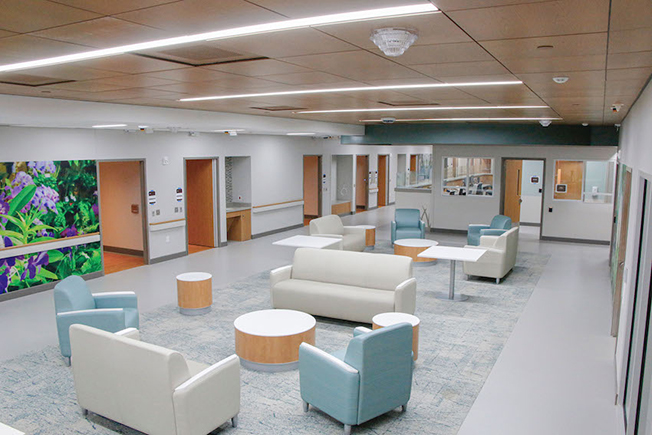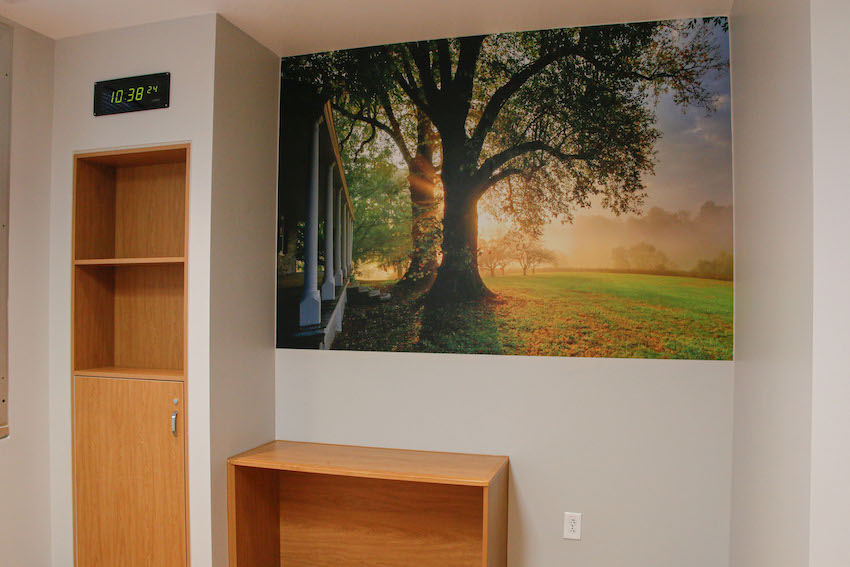Spotlight on Main Line Health: What we’re doing to meet soaring community mental health needs

At any given point, inpatient psychiatric beds across the Philadelphia region are in high demand and at capacity. While the mental health crisis continues to escalate, Main Line Health is leading the way in addressing unmet community mental health needs with the expanded inpatient psychiatric unit at Bryn Mawr Hospital that opened in early March.
In the Main Line Health service area, 1 in 4 people have been diagnosed with a mental health condition. 40 percent of people who have a mental health diagnosis are not receiving mental health treatment. – 2019 Community Health Needs Assessment, Main Line Health Acute Care Hospitals
"This crisis has predated the pandemic," explains John Schwarz, president of Bryn Mawr Hospital, reflecting on the recent expansion of the inpatient psychiatric unit. Serving adult patients ages 18 and older, the expanded two-floor unit includes 40 private rooms in a welcoming environment that allows for a wider range of therapies while supporting individual growth and recovery.
"Patients in a behavioral health crisis can face lengthy waits in the emergency department while waiting for inpatient beds to open," Schwarz continues. "These waits can be measured in days and are a tremendous patient dissatisfier. Adding 20 additional beds directly addresses this issue."
Behavioral health needs in the community since COVID
The expanded inpatient psychiatric unit could not have come at a better time as the need for behavioral health services has grown significantly since the pandemic began in early 2020.
Multiple community hospitals with inpatient psychiatric units across our region have closed or consolidated which has led to an increase in behavioral health-related visits in Main Line Health's emergency departments (ED) and EDs around the region. During the first year of the pandemic, one observation was that overall patient traffic at Bryn Mawr Hospital decreased significantly among ED visits, but those who did manage an ED visit were experiencing some sort of mental health issue or concern.
A COVID-19 Telehealth Practitioner Survey by the American Psychological Association indicated psychologists who provide treatment saw significant increased demand across all treatment areas, especially depression and anxiety, between 2020 and 2021.
Add to that a staggeringly high number of patients now being screened for depression and anxiety since the early days of the health crisis. According to Mental Health America, more than 2.6 million people took a mental health screen in 2020. This represented a nearly 200% increase over the number of people who completed a screening in 2019. Clearly, mental health is on a lot of people's minds.
Schwarz adds that the impact of a pandemic—having a large outbreak of transmittable disease—creates fear and grief that's compounded by social restrictions, underemployment and unemployment, which affect individual populations.
How the new inpatient psychiatric unit better accommodates patients and programs
With acute care mental illness, the first line of defense for stabilization is through medication and management of symptoms. Once a patient's symptoms are under control, the patient can participate more fully in group therapy sessions and other therapeutic programs such as music therapy or art therapy.

The newly expanded inpatient psychiatric unit at Bryn Mawr Hospital can now accommodate a greater breadth of programs and experiences for its patients.
"The existing inpatient psychiatric unit had limitations because many of the treatments our patients underwent were in a group setting," Schwarz explains. "The newly expanded unit is quadrupling the amount of space which will allow for more group therapy interactions, staff areas, additional programming, and the ability to run multiple programs simultaneously."
The vision for Bryn Mawr Hospital was to have multiple types of therapy offerings for every type of patient that came through the building. The expanded inpatient psychiatric unit allows for customized programs such as group therapies (may include art, music, recreation, and dual diagnosis) and evidence-based therapies (may include Mindfulness, Guided Meditation, Dialectical Behavior Therapy).
"We wanted to add more rehabilitative components," says Schwarz, "knowing that the earlier we start that in therapy, the better."
The expanded unit also applies the use of light and sound to mimic circadian rhythms to positively affect mood and help with those patients suffering from depression.
Who's eligible for inpatient psychiatric care?
Many of us may have experienced the mental health effects of the last two years with so much uncertainty around us. For some, seeing an outpatient mental health therapist or practicing self-care techniques and physical activity are enough to address stress, anxiety, and mood issues.
For others, inpatient treatment may be an option when psychiatric symptoms begin to pose a danger to the patient or others. These individuals may require 24-hour observation and care when they have:
- Thoughts of suicide or self-harm
- Irrational thoughts to harm others
- Other dangerous behaviors
- An inability to take care of basic needs due to psychiatric symptoms
In some cases, inpatient psychiatric care may be recommended for someone who can no longer take care of themselves; for example, they are not bathing, eating or leaving the house.
Generally, behavioral health providers see an increase in mental illness during times of transition, whether from high school to college or from college to a job, or during the loss of a relationship or the death of a loved one.
"It can happen to any of us," Schwarz adds.
An inpatient assessment will take these variables into consideration when determining whether inpatient care is appropriate.
Taking a mental health day here and there is okay. It's the concurrent loss of interest in daily life when you may want to seek additional help.
Main Line Health has long been committed to serving the region's community mental health needs.

We will be adding supplementary outpatient therapy services on the Bryn Mawr Hospital campus later this year. Teletherapy services will be added to complement existing outpatient programs offered at Mirmont Outpatient Centers in Broomall, Exton and Media, and at the Women's Emotional Wellness Center locations in King of Prussia and Newtown Square.
"We want to expand our capacity to reach patients before they cycle into crisis or to provide a safe landing after they've had inpatient treatment. Some people don't have anyone to do reality testing, to help navigate that process for themselves," Schwarz explains. "We want to help prevent an inpatient admission."
The reasons people don't get mental health care are varied. Some people may not have insurance coverage for behavioral health services while others experience a stigma around mental health. There is also a shortage of mental health therapists who accept insurance.
"The broader point here is to improve access to these services," adds Schwarz.
In the absence of affordable health care for mental health, the purpose of outpatient mental health services is to intervene before there is a mental health crisis while providing a continuum of care—a place for a patient to go after they leave the inpatient psychiatric unit.
"Everything we're building is designed with that continuum in mind," says Schwarz.
Community support bolstered expansion of inpatient psychiatric unit
The expanded inpatient psychiatric unit at Bryn Mawr Hospital was made possible by a generous community of donors who raised more than $11 million in charitable gifts to support the project.
"The outpouring of financial and emotional support from our community has been overwhelmingly positive and we are extremely grateful," says Schwarz. "Mental illness is impacting all of us, in our family and social networks. It's become much less of a social stigma in recent years as patients, families and communities are having more open and frank conversations, which have led to a greater understanding of the challenges of mental health and its impact on people's lives."
Mental and emotional well-being are integral to a healthy life. When people suffer with mental illness or drug and alcohol abuse, it significantly impacts all aspects of their lives and their loved ones.
Main Line Health offers behavioral health services, from group therapy and individual therapy to 12-step meetings for drug and alcohol addiction. It all begins with a phone call. Please call 1.888.CARE.898 (227.3898) to schedule a confidential appointment.
 Content you want, delivered to your inbox
Content you want, delivered to your inbox
Want to get the latest health and wellness articles delivered right to your inbox?
Subscribe to the Well Ahead Newsletter.
